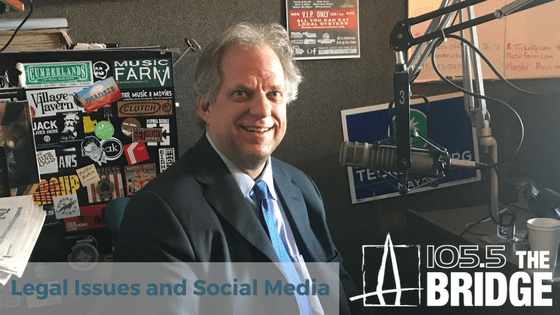Legal Issues and Social Media

Note: This was featured as part of our Wednesday segment on Charleston’s 105.5 The Bridge with Box in the Morning. You can catch us every other Wednesday morning at 8:50 am ET for the latest law tips and legal news. You can listen to the segment below:
Users on popular social media sites such as Twitter, Facebook, Instagram, and Snapchat are often encouraged to share personal pictures and information with their followers. Whether it’s a photo of you and your friends enjoying a night out on Instagram or a rant about an unfair employer on Facebook, it’s easy to think that only friends and family can access our social media posts. However, most online activities can be discovered during the litigation process if you are involved in a court case. Here are five ways to protect yourself from legal issues when posting on social media.
- Watch what you post
Lawyers will often use social media to discover information about potential jurors, clients, and the opposing party. In some court cases, the defendant can be asked to submit social media profiles and photos. For example, a picture of a client partying while he or she was supposedly recovering from an injury can sway the jury to rule against the client. Never post something on social media that you wouldn’t be comfortable saying or showing in any other public setting.
- Make your accounts as private as possible
Although nothing on social media can ever be completely private, activating all available privacy settings will help keep your information out of the hands of someone who would use it against you. Regardless of your perceived online privacy, you should never post content that is defamatory or personally compromising. However, even if you have nothing you hide, you may not want your private information shared with strangers. Most social media sites have extensive privacy settings that are easy to understand and activate.
- Don’t delete
If you have posted questionable content online prior or during involvement in a lawsuit, you may be tempted to clean up your social media presence. However, if it can be shown that the social media content was relevant to the court case, you may be charged with destroying the evidence and be subject to expensive fees. Don’t post something thinking you can always delete it later– instead, don’t post it to begin with. You should only delete posts if you are not currently under investigation or involved in a court case. However, if you do find yourself in a situation where your social media presence could be used against you, change your settings to private immediately and seek legal counsel.
- Educate your children
Although young people can be social media savvy, they are also at a greater risk for impulsively posting something without considering the consequences. Whether it is defamatory comments or references to illegal drugs and alcohol, your child could be taken to juvenile court if the posts are seen by the wrong person. Educate your children about the risks of social media and emphasize the potential publicity of a bad tweet gone viral. Even if your child is underage, he or she is not exempt from legal repercussions. Negative social media posts can also discourage future employers from hiring your child when he or she is older.
- Search yourself on Google
Take a few minutes to search yourself on Google and the social media platforms you have posted on to get an idea of your online presence that is visible not only to you but to others. You may come across an inappropriate tweet from several years ago or a photo you were tagged in that, upon reflection, needs to be deleted or your profile needs to be set to private. Remember that if an online post is relevant to the court case and can be authenticated and attributed to you, it may be used against you.
Concerned about your online presence? Need legal advice? Give us a call at (843) 552-6011. Let our team at the John Price Law Firm fight for you to get the justice you deserve.